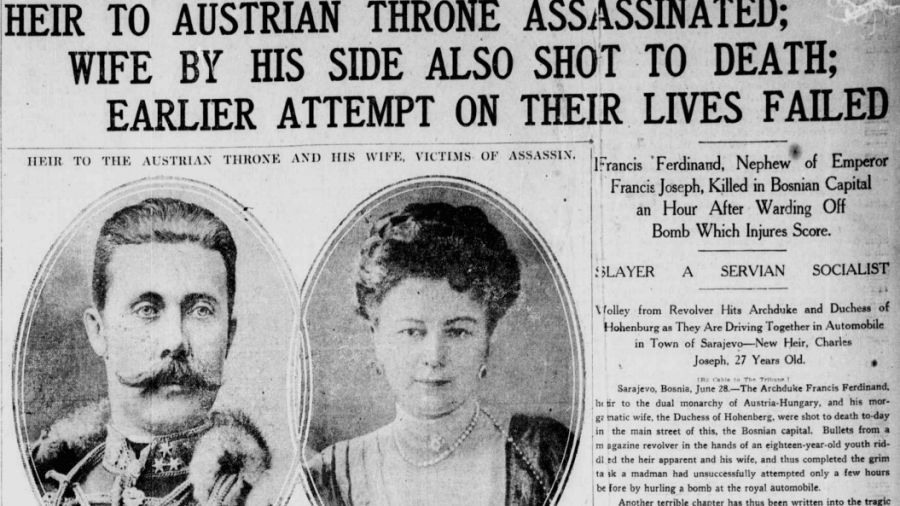The Beginning… Of A War To End All Wars
Newspaper heading and article announcing that Archduke Ferdinand has been assassinated along with his Wife.
The Beginning… Of A War To End All Wars
By: Briar Hopkins
Have you ever heard the phrase by H. G. Wells, “The war to end all wars”? The origin of this phrase was at the start of World War I when H. G. Wells published some newspaper articles titled, ‘The war to end all war’. Obviously, WWI was not the last great war nor was it the final war in history to come. In this article I will be talking about how WWI began.
The Franco-Prussian War – 1870 to 1871
The Franco-Prussian War was a war fought between France and Prussia from 1870 to 1871. The war was caused when Otto von Bismarck made prince Leopold of the Prussian Hohenzollern Royal Family make a bid for the Spanish Royal Throne. Napoleon III of France did not like this idea and tried to block it, insisting King Wilhelm I of Prussia apologize to the French. Wilhelm refused to do so and let Bismarck publish the demands of the French along with Wilhelms rejection of them, thus starting the Franco-Prussian War. With the Prussians winning the war, the rivalry between France and Germany would begin and continue on to WWI when that rivalry broke into a full scale war.
The Franco-Russian Alliance – 1894
The Franco-Russian Alliance was an alliance that was set up between Russia and France in 1894 and lasted until 1917. The Alliance was made because France, which had been subdued and disgraced in the Franco-Prussian War which we just talked about, and Russia both were both concerned about Germany’s rise to power and decided to become allies for Mutual protection against Germany, which had made alliances with the Kingdom of Italy and Austria-Hungary. This alliance would be the foundation for the triple entente of Russia, Britain, and France during World War 1.
The First German Naval Law – 1898
The First German Naval Law was a legislation advocated by the Secretary of the German Imperial Navy, Admiral Alfred von Tirpitz, in 1898. The law was the 1st of 5 laws that would increase the size of the German battle fleet to where they envisioned they would have a naval force superior to that of the British royal navy. And with having naval superiority over the British royal navy which Tirpitz was aiming for, Britain would be forced to become an ally of Germany on the terms of the Germans. Well, Psych! That last sentence wasn’t how it all turned out. Instead of responding the way Tirpitz and the Germans hoped for, the British responded by building even more naval ships and forging alliances with Japan, France, and Russia.
The Russo-Japanese War – 1904 to 1905
The Russo-Japanese War was a war between Russia and Japan from 1904 to 1905. The war was started because Czar Nicholas II wanted to have a port in the Pacific for commercial ships and his navy and he set his sights on Korea. Japan saw this aggressiveness of Russia against Korea as a danger and menace to Japan so they led a surprise attack on Czar Nicholas II’s Naval Fleet at Port Arthur, China. Japan won the war which turned Russia’s ambition to expand to the east westward, toward the European Balkan Region in South-Eastern Europe. This aggressiveness of Russia would be a factor that would later trigger WWI 9 years later.
The Second Moroccan Crisis – 1911
The Second Moroccan crisis was the second crisis to occur between French and German interests in Morocco. The Second Moroccan Crisis occurred when Alfred von Kiderlen-Wächter, the German Foreign Secretary, sent a German Naval Cruiser to a harbor on the coast of Morocco as a reaction to a recent tribal revolt that Germany thought was being supported by the French so they could use it as a justification for subjugating Morocco. However, just like in the First Moroccan Crisis Britain supported France in this crisis and the Germans would be forced to recognize the validity of a French Protectorate in the country of Morocco.
Italian Invasion of Libya – 1911
The country of Italy had been left out of the scramble for land and colonization that made the Transcontinental Empires of Britain, Spain, and France. So to get itself some land and to take a part in the game of Imperialism/Colonialism, the Government of Italia decided to aim for Libya, a country in North Africa that hadn’t got colonization or territorial claim from other Western European Countries and take it from the Ottoman Empires possession. The war that followed with Italy and the Ottoman Empire ended in a peace treaty. However, the Ottoman Military deserted Libya and gave it up to Italy for colonization. The real notable thing about the Ottomans letting the Italians take Libya was that it revealed how vulnerable the Ottoman Empire was and that it was losing its control over its territories. The Italian takeover of Libya would be one of the factors that would in time lead to WWI.
The Balkan Wars – 1912 to 1913
In the 1800s, Serbia, Bulgaria, Montenegro, and Greece broke away from the Ottoman Empire. And in 1912 they formed an alliance backed by Russia called the Balkan League which aimed at taking away the territory that the Ottomans/Turks still held in the Balkan region. In the first Balkan war fought, the Ottoman Empire fought and lost to Serbia, Montenegro, and Greece. Unfortunately, shortly after this the Balkan League dissolved and the Second Balkan War began with Bulgaria fighting Serbia and Greece over Macedonia. Soon the Ottoman Empire and Romania had joined the war against Bulgaria and ultimately, the war ended with Bulgaria being defeated and a power void was left behind from the Ottoman Empire. This would lead to a rise in tension between Balkan states, especially between Austria-Hungary and Serbia. And this tension would eventually lead Austria-Hungary and its ally, Germany, to deciding that war with Serbia would be required in order to strengthen the position of Austria-Hungary. The Balkan Wars would be a factor, along with all the other events mentioned in this article, that would in turn lead to WWI.
The Assassination of Archduke Ferdinand – 1914
In 1914, Archduke Franz Ferdinand and his wife Sophie were assassinated in a car in Sarajevo by 19 year old Serbian, Gavrilo Princip. Archduke Ferdinand had been in Sarajevo because he was the Inspector general of the Austro-Hungarian Army along with being the Heir to the Austro-Hungarian Throne. And the Austro-Hungarian army had decided to have the summer military exercises in the Capital of Bosnia, Sarajevo. Serbian Nationalists found it an insult that Archduke Franz Ferdinand visited Sarajevo on the day he did, which was St. Vitus’ day, so they sought to strike back for the insult. Their first attempt at assassinating Archduke Franz Ferdinand was by a Bosnian Serb named Nedeljko Čabrinović. He attempted to assassinate the Archduke by throwing a bomb at the car the Archduke was in, however the driver of the car managed to accelrate enough that the bomb missed their car and instead hit the car behind the Archdukes car. Several people and the adjutant to General Oskar Potiorek in the car behind were injured. Seeing that he had failed Čabrinović took his cyanide Pill and jumped into a nearby river to kill himself so he couldn’t get arrested, however the cyanide didn’t work and the depth of the river was too shallow for him to drown so he was apprehended by the police soon after he jumped into the river. After Čabrinović was apprehended the Archduke decided that would continue driving to the planned event happening at City Hall. After finishing up the event happening at City Hall the Archduke wanted to visit the Adjutant and officers in the hospital who were wounded from Čabrinovićs bomb. However, the drivers of the two cars at the front of the motorcade were Czech and for the reason of security the motorcades route was changed from going down Franz Joseph street to going down Appel Quay Street. But all of this was said in German so the Czech Drivers didn’t understand a word of it and nobody had bothered to translate for them, so they took the original planned route down Appel Quay Street. Unfortunately, Princip happened to be stationed down this street at a general store’s awning. Seeing that the Czech drivers had taken a wrong turn, General Potiorek started to yell at him to reverse. But it was not of any use, Princip, seeing that his target was in front of him, took out his pistol and fired two shots at the Archduke. Unfortunately, the assassin didn’t miss his shots. 1 bullet pierced Archduke Ferdinand’s neck and the other hit Sophie in the Abdomen. The assassination of Archduke Franz Ferdinand was a success, and consequently WWI began a month later.
In conclusion, WWI ultimately began with the Assassination of Archduke Franz Ferdinand and WWI breaking out a month later. WWI may not have been the war to end all wars, but it was one of the most important wars in history because it changed the way wars were fought and advancements in military technology and technology in general were made. In my next article, we’ll be talking about these changes in how war was fought, the advancements in military technology, and trench warfare on the Western Front of the Great War.
History.Com – World War 1 Causes
History.Com – The Franco-Prussian War
History.Com – How a Wrong Turn started World War 1












